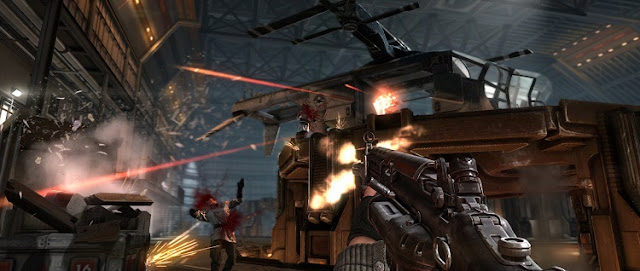It's only been over the last year that I've really begun to take notice of this trend, starting with the PC release of Final Fantasy XIII. When I perused the specs for the game on its Steam page, I noticed that it requires a 60GB download. Even with all of the fancy cut scenes and dual Japanese / English voice acting, that's a pretty bitter pill to swallow, and required some creative uninstalling to make space for it. Sure, we get slightly less annoying dialogue from Vanille, Hope, and Snow, but it comes at a very high cost.
Final Fantasy is by no means alone, though. There are plenty of other games that are sporting some rather hefty downloads. Titles like Wolfenstein: The New Order (50GB), Elder Scrolls Online (85GB), Grand Theft Auto V (65GB), and Batman: Arkham Knight (55GB) are but a few examples of the bloat we're beginning to see in terms of how much hard drive space games are beginning to gobble up.
Granted, all of the games that I've mentioned are of the AAA variety. Those that have little to no interest in that sort of thing aren't really affected. Nonetheless, there's still a substantial number of people who do like them, and are being impacted by this.
 |
| Wolfenstein: The New Order is a 50GB goliath. |
To an extent, growing game sizes makes sense. As mentioned at the beginning of this article, it's something that has been happening for years. With each leap forward in technology, we've seen games' graphics get better, but it comes at the cost of bigger files. Now, as this process has continued for 30 years or so we're at this point where the files in question are gargantuan.
That being said, when I look at some of the other recent titles to come out that have had some very high fidelity visuals, they haven't suffered from quite the same bloat as the traditional AAA games have. One just needs to look at something like The Witcher III or Elite: Dangerous. Both have been released only in the last year, have stunning visuals, and yet they've managed to avoid the 50GB+ club. This in mind, it does begin to bring into question what some of these other studios are doing when making their games. Is there a certain level of sloppiness in the coding that is contributing to this bloat?
 |
| Elite: Dangerous looks gorgeous, yet manages to clock in at only 7GB. |
This doesn't even take into account the console side of things. Those have some pretty small hard drives that can fill up fast. It is possible to replace them, though much easier on the PS4 than the Xbox One by most accounts. The question is how many people out there will actually do this. I'm sure the majority of those reading this article have the technical wherewithall to do such a swap in their sleep. However, when it comes to the general public, I'm not so sure. How many people in that group will upgrade their console HDDs? I can't imagine them doing so en masse.
 |
| Grand Theft Auto 5 gobbles up 65GB on PC. |
All of this being said, I have to wonder if the growing install size of modern games will be a problem that is corrected on its own. It's hard to imagine this not impacting purchasing decisions. I know I'm thinking twice before buying a game now, taking the time to look at its specs and make sure of just how much hard drive space the thing is going to take. If it's over 25GB I stop and give the game some very serious thought before proceeding. In many cases, I actually don't buy it, or at least put it off for quite some time. Sure, I'm missing out on an experience, but I also don't have to rearrange a small army of other games in order to make space for that big one. Moreover, it alleviates having to worry about going over my bandwidth limit for the month.
 |
| Elders Scrolls Online takes a whopping 85GB of storage space. |
It wouldn't surprise me if others are doing likewise, and this may well help to force developers to examine how they're making their games. Should sales begin to take a hit because games are getting to darn big, they'll have to sit down and take a look at what they're doing and find a way to address the issue. The sad thing is that I don't see this happening any time soon. For now, we're just going to have to suffer through these massive installs, and get creative with managing hard drive space and our monthly bandwidth.
